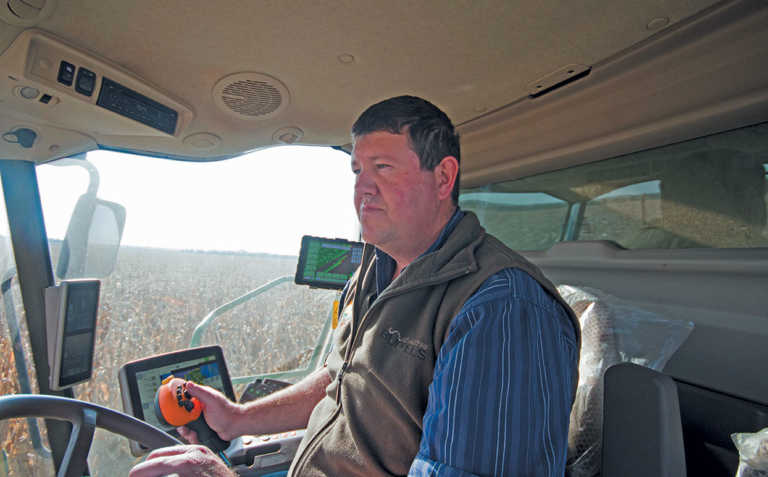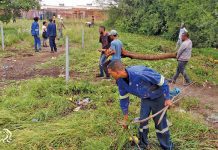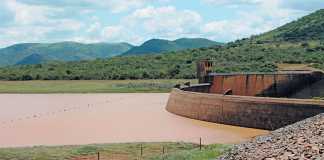
Photo: Sabrina Dean
Jaco Minnaar is the fourth generation of the Minnaar family to farm on Uitsny, near Hennenman in the Free State.
Uitsny was purchased by his great-grandfather in 1918, but is today part of a farming unit comprising several contiguous farms and separate parcels of land. Jaco also owns land near Bothaville, which allows him to spread his risk.
“The land in Hennenman usually does better in a wet year, whereas land in Bothaville tends to perform better in a dry year. Whether it rains a lot or very little, I have a harvest to suit either scenario. It may not be the best but I also won’t be the worst off,” he says.
Jaco plants approximately 2 500ha/year to dryland crops. Most of this is maize, but he
also grows other summer grains such as soya beans and sunflower. In addition, he runs a small cattle component, and a small herd of buffalo in a joint venture with other partners.
Precision agriculture
Jaco bases his planting decisions on a number of factors, including soil moisture content, climatic expectations, grain prices and global grain supply levels.
He is a firm believer in precision agriculture and also tries to introduce conservation agriculture techniques into his operation where viable.
“Because my lands are so diverse, I treat each one differently. For example, about 30% of my lands are entirely no-till,” he says.
He manages the rest of the lands with conservation in mind but leaning towards more conventional practices.
“I try to do as little tillage as possible – just enough to create the necessary densification layers.”
Analysing every square metre
In addition to practising precision farming and no-till, Jaco tries to gain an understanding of the physical and chemical composition of his soil. To this end, he conducts extensive trials on all his lands annually.
Yield charts are his most important precision agriculture tool, but he stresses that these are only effective if built on a solid foundation.
“If you don’t measure what you’ve harvested and what a specific piece of land is delivering, you can’t adapt quickly enough and can’t remedy your potential yield on a metre-by-metre basis.”
To obtain a clear picture of how effectively he can use available water, he uses yield charts in conjunction with charts outlining the chemistry and physical structure of the soil.
“The problem with physical and chemical charts is that the resolution is not so high – 100m x 100m. What happens within that 100m is where the yield charts come in – they provide me with the square metre picture,” he explains.
“I first look at the physical structure, which determines how much water can be stored in the soil. Then the soil chemistry determines whether the plants can use the maximum amount of water. For example, is there enough nutrition to use all the available water?
Once I’m satisfied with that, I establish my fertilisation goals. My final test is the yield chart.”
Turning data into action
Having data on paper is not enough, however, Jaco stresses. Soil quality must still be assessed visually, and to do this, he digs profile holes.
“If you don’t know what’s happening with the roots beneath the ground, whether there’s some kind of inhibitor, either physical or chemical, that needs rectifying, you won’t be able to improve.”
Knowing what is going on beneath the surface can make the difference between success and failure in a farming operation, he emphasises.
He cautions, however, that all this information is of little use if it is not put into practice.
“Our problem is that we have a wealth of information, but don’t necessarily know how to use it. For example, many farmers have yield data for the past 10 years but don’t know how to interpret and apply it.”
The challenge over the next decade will be to use all the data in an integrated manner.
“The soil chemistry, and physical and yield charts are just the tip of the iceberg,” he says. Other variables include rainfall data, fertilisation goals, plant density, and cultivar data in terms of how different cultivars perform in different areas.
“Most farmers are technologically advanced but don’t necessarily have the time to sit and process all the data. We’ll eventually have to rely on experts to process the data and make the necessary recommendations.”
He also believes that data interpretation will be key to attracting younger people into the agricultural sector.
Farming as a passion
Despite the numerous risks and challenges, Jaco says he loves being a farmer and cannot imagine doing anything else.
“This is my passion. Farming is what I want to do. I like the lifestyle. I like the people. I like sitting on a tractor and using the technology. I like planting in the wet earth and watching as that plant comes up out of the ground and develops. I can show you the pictures on my phone …”
For Jaco, the most rewarding aspect is harvest-time.
“After putting in so much effort, and with grace from above, you can reap the harvest. Finally, the lands are cleared, and you’ve done the best you can do. That’s the most rewarding feeling,” he says.
The worst feeling, on the other hand, is when there is no harvest at all. “When you’ve done the calculations and looked at it from every direction, the only thing that carries you through is faith.”
Jaco says that other farmers sometimes forget that in addition to serving in an official capacity as chairperson of Grain SA, he is a farmer too, who experiences the same trials and tribulations as they do.
“I often find a farmer will come and explain his farming problems to me and why he is struggling, when I’m personally going through exactly the same thing. The low maize price is an example – right now I also feel it in my pocket!” he concludes.
Email Jaco Minnaar at [email protected].












